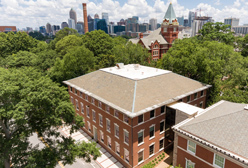Sponsored Research
Ute Fischer, research scientist in the School of Literature, Media, and Communication has been awarded a three-year grant for $890,916 by the National Aeronautics and Space Administration (NASA) for the project "Protocols for Asynchronous Communication in Space Operations: Communication Analyses and Experimental Studies."
Alasdair Young, associate professor in The Sam Nunn School of International Affairs, has been awarded €45,000 (approximately $55,000) as a Jean Monnet Chair for the three-year project "The European Union in Global Technology Governance." The grant funds the development of classes begun in fall 2012, an academic workshop to be held in the spring 2013, and a series of public lectures on campus. Young is the only U.S. recipient among the 75 Jean Monnet Chairs awarded worldwide in 2012.
Faculty Books
Chinese Under Globalization: Emerging Trends in Language Use in China (World Scientific, 2012), co-edited by Jin Lui, assistant professor in the School of Modern Languages, with H. Tao. This book examines recent trends in language use in mainland China, and the associated social, economic, political, and cultural manifestations. It may be the first concerted effort to present a scholarly, panoramic view of linguistic struggles and linguistic politics in contemporary China.
Alasdair Young, associate professor in The Sam Nunn School of International Affairs, has a chapter, "Trade Policy," published in The Oxford Handbook on the European Union (Oxford University Press, 2012), edited by A. Menon, E. Jones, and S. Weatherill. The book covers the major institutions, policies, and events in the history of the European integration and provides a guide to the major theoretical approaches that have been used to study it over time.
What Does Georgia Tech Think?
Selected Press for Ivan Allen College of Liberal Arts
|
October 12, 2012 - October 14, 2012
8:30 am
October 22, 2012
11:30 am
October 23, 2012
11:00 am
October 23, 2012
12:00 pm
October 24, 2012
12:00 pm
October 31, 2012
11:30 am
November 12, 2012
4:00 pm
|
Message from Dean Jacqueline Royster
Some academic colleagues recently described the Ivan Allen College of Liberal Arts as ‘non-traditional’ and ‘ambitious.’ I think those descriptors emphasize attributes that have been foundational to the success of this college. A huge amount of energy is required to blaze a new path, to imagine possibilities, and to demonstrate validity. Each and every day, IAC faculty, staff, and students bring extraordinary energy to creating new liberal arts with perspectives that are relevant and valuable in our highly technological society. That innovation and energy underlie numerous transformative initiatives, programs, and projects that are unfolding within the college.
Research
IAC faculty direct more than a dozen research centers spanning areas of inquiry ranging from ethics in technology, to cybersecurity, to digital media and communications. Four new centers are underway, bringing exciting new dimensions to our research. They are the Center for European and Transatlantic Studies directed by Dr. Vicki Birchfield and Alasdair Young; the Intel Science and Technology Center for Social Computing led by principal investigator, Carl DiSalvo, and co-PIs Ian Bogost and Christopher Le Dantec; the newly established Center for Media Studies directed by Ian Bogost; and the Center for Urban Innovation headed by Dr. Jennifer Clark.
Teaching
This year, we’re also adding two new curricular programs. Dr. Anne Pollock has taken the lead in developing a new graduate certificate that was implemented this fall in Science, Technology, and Society. STS is an interdisciplinary field of study that seeks to understand the interplay and influence between those three areas. We expect the STS certificate to garner interest among graduate students from across campus. Dr. John Tone and Dr. Steve Usselman are leading the development of a Sports, Society, and Technology (SST) program in the School of History, Technology, and Society. This program will bring to the fore important cites of convergence for studies related to urban environments.
Public Service and Community Engagement
 In our community endeavors, I have brought together a wide array of groups to create a new city-wide event that will showcase Georgia Tech’s global footprint. Modeled on the highly successful France-Atlanta, Africa Atlanta will focus on the transatlantic relationship between Africa, the U.S., and Europe – arts and culture, history, technology, and business. A year-long array of events for 2014 will be announced during Georgia Tech’s 2013 African Film Series (led each year by Dr. Angela Dalle Vacche), scheduled to begin on April 2, 2013. In our community endeavors, I have brought together a wide array of groups to create a new city-wide event that will showcase Georgia Tech’s global footprint. Modeled on the highly successful France-Atlanta, Africa Atlanta will focus on the transatlantic relationship between Africa, the U.S., and Europe – arts and culture, history, technology, and business. A year-long array of events for 2014 will be announced during Georgia Tech’s 2013 African Film Series (led each year by Dr. Angela Dalle Vacche), scheduled to begin on April 2, 2013.
 We continue to enrich our stewardship of Mayor Allen’s legacy. Our Westside Community Alliance kicked off its second year with more than sixty people from public, private, community, and non-profit entities, and faculty, staff, and students from across Georgia Tech attending the meeting. Through the WCA, we are working to bring greater coherence to an increasing set of efforts at Georgia Tech to engage neighborhoods on the western border of campus. Over the next few months, the modest website that we launched in May will be enhanced to serve as a more dynamic asset for information so do book mark the page! We continue to enrich our stewardship of Mayor Allen’s legacy. Our Westside Community Alliance kicked off its second year with more than sixty people from public, private, community, and non-profit entities, and faculty, staff, and students from across Georgia Tech attending the meeting. Through the WCA, we are working to bring greater coherence to an increasing set of efforts at Georgia Tech to engage neighborhoods on the western border of campus. Over the next few months, the modest website that we launched in May will be enhanced to serve as a more dynamic asset for information so do book mark the page!
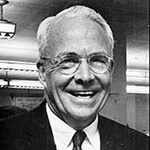
We are also moving forward the Ivan Allen Jr. Digital Archives. Led by IAC IT Director Steve Hodges, the project will connect and highlight archives from across the city and introduce a narrative exhibition about Mayor Allen. This project is particularly timely given the 50th anniversary in 2014 of the Civil Rights Act, an historical moment that provides a stellar opportunity to help educate the public about Mayor Allen’s example of advocacy and urban leadership.
Among our institute-wide initiatives are the Ivan Allen Institute for Advanced Studies directed by Dr. Kenneth Knoespel and the Policy@Tech consortium led by Dr. Susan Cozzens. This Spring, we will also celebrate the opening of the renovated Stephen C. Hall Building on Bobby Dodd Way as the new home of the Georgia Tech/IAC Writing & Communications Program which is led by Dr. Rebecca Burnett.
This is just a sampling of the transformative work unfolding in the college. I hope that you will read more about the passion, drive, and accomplishments of IAC faculty, staff, students, and alumni in this edition and in future editions of our newsletter.
To IAC administration, faculty, staff, and students, to our generous donors, our Advisory Board, and our many friends and alumni of the College, thank you for your ongoing support, your great expectations, creativity and vision, and your hard work and enthusiasm. Together, we are creating a bright future.
|
Bogost to Develop Center for Media Studies; Mazalek is New Director of Graduate Studies in Digital Media
Poised to enter its third decade as leader in the field, Georgia Tech’s top-ranked Graduate Program in Digital Media (DM) will make that transition under new leadership. At the same time, the Ivan Allen College School of Literature, Media, and Communication (LMC) which houses the DM program, also announces the formation of a new research center for media studies.
Alexandra Mazalek, associate professor in the LMC, is the newly appointed director of the DM program. LMC professor, Ian Bogost, who has led the DM program for the past two years, has been named Ivan Allen College of Liberal Arts Dean’s Distinguished Professor in Media Studies and is charged with founding the Center for Media Studies. In addition to his appointment in IAC, Bogost is also now on faculty in the College of Computing.
“Ali Mazalek brings the best qualities for a position that demands dedication to excellence in graduate teaching and mentoring, highest standards in research, and a commitment to the multidisciplinary and collaborative atmosphere in our unit,” said LMC chair Richard Utz. “Ian’s leadership of the media studies center guarantees national and international attention to our unit’s mission to provide humanistic perspectives on a technological world.”
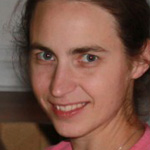
Mazalek is a graduate of the MIT Media Lab (M.S. & Ph.D.). Her research in computing and interaction design supports integration of the physical and digital worlds. She founded the Synaesthetic Media Lab at Georgia Tech, which works with a variety of physical sensing technologies to design embodied interaction platforms and also investigates the implications of those interactions for creativity and cognition.
“A distinguishing feature of our Graduate Program in Digital Media is the solid theoretical foundation we provide students for designing novel computational systems, combined with hands-on exploration and experience working with physical and digital materials, media, and technologies,” said Mazalek.
 An award-winning designer and media philosopher whose work focuses on videogames and computational media, Ian Bogost is an influential thinker in both the game industry and research community. His research and writing considers videogames as an expressive medium, and his creative practice focuses on political games and artgames. An award-winning designer and media philosopher whose work focuses on videogames and computational media, Ian Bogost is an influential thinker in both the game industry and research community. His research and writing considers videogames as an expressive medium, and his creative practice focuses on political games and artgames.
Bogost has already begun shaping a vision for the new media studies center. “Media Studies is a mature field that addresses all aspects of the role of media of all sorts in culture. It’s time for Georgia Tech to make its mark in this broad area.”
Bogost expressed his intention to interpret Media Studies in the way the Digital Media program has always operated: as a place for creation as much as history and criticism.
Janet Murray, who directed the Graduate Program in Digital Media from 2000 through 2010, says of the change in leadership: “It’s been exciting having Ian lead the group for the past two years, and it allowed us to take a fresh look at a lot of structures, re-energize them, and sharpen our focus. We are very lucky to have such a uniquely strong faculty in humanities-based digital design, and to be at Georgia Tech where cross-disciplinary collaboration is the norm.”
LMC’s graduate program in Digital Media has been a leader in offering academic degrees in the field, with the M.S. in Information Design and Technology founded in 1992, (now called the M.S. in Digital Media), and the Ph.D. in Digital Media founded in 2004. The program is also part of the interdisciplinary M.S. in Human-Computer Interaction, in conjunction with the College of Computing and the School of Psychology. The program already has numerous graduates working for companies such as Ideo, Google, IBM, Turner Broadcasting, and EA. In 2010 it moved its home to the third floor of TSRB, uniting the offices, graduate student carrels, and lab facilities, and enhancing its participation in the interdisciplinary GVU Center.
|
Obama Nominates Brown for Second Term on TVA Board
|
|
President Obama has nominated Marilyn Brown for a second term on the Board of Directors of the Tennessee Valley Authority, one of the nation's largest utilities and an $11 billion a year entity. Brown, a professor in the School of Public Policy, completed a two-year term on the board in May. Her nomination, along with four other nominations announced September 21st in a White House news release, are subject to Senate confirmation which is expected to occur after the November presidential election. |
Carnegie Names Sam Nunn the First Recipient of Nunn-Lugar Nuclear Security Award
|
|
Former U.S. Senator Sam Nunn, distinguished professor in the Georgia Tech Ivan Allen College of Liberal Arts, and Senator Richard Lugar are the first recipients of a new international award created in their honor to recognize those advancing the cause of nuclear security. Announced on August 29th, the Nunn-Lugar Nuclear Security Award is co-sponsored by the Carnegie Corporation of New York, a philanthropic foundation, and the Carnegie Endowment for International Peace, an international think tank, to mark the occasion of their centennials. It will be awarded biennially. “To be given an award for nuclear security from the Carnegie Corporation and the Carnegie Endowment for International Peace, to receive it alongside my friend and partner Senator Richard Lugar, and to have the award named for the two of us, is a thrilling affirmation of much of my life’s work,” said Senator Nunn. “With its influential work to reduce nuclear dangers before Nunn-Lugar was passed, Carnegie was among the creators,” said Nunn. “I am both honored by the award and excited about the future as these outstanding organizations remind the world again through this award how urgent it is, for the sake of peace and the survival of humanity, that we accelerate our efforts.” Nunn and Lugar authored the bi-partisan 1991 Nunn-Lugar Act which established the Cooperative Threat Reduction Program (CTR). The program sought to help states of the former Soviet Union safeguard and dismantle their enormous stockpiles of nuclear, chemical, and biological weapons, related materials, and delivery systems. CTR has contributed to the deactivation of more than 7,500 nuclear warheads, neutralized chemical weapons, safeguarded fissile materials, converted weapons facilities for peaceful use, mitigated bio-threats, and redirected the work of former weapons scientists, and engineers, among other efforts. “I cannot think of two individuals more deserving of this recognition than Senators Nunn and Lugar,” said Vartan Gregorian, president of Carnegie Corporation. “Not only is the Cooperative Threat Reduction Program one of the most important pieces of legislation in the latter half of the 20th century, it is also one of the most important nuclear security measures taken by the world up to that point. We all owe Senators Sam Nunn and Richard Lugar an enormous debt of gratitude.” A U.S. Senator from Georgia from 1972 through 1996, Nunn is co-chairman and CEO of the Nuclear Threat Initiative. His vision guides The Sam Nunn Bank of America Policy Forum which has been held biennially since 1997 by The Sam Nunn School of International Affairs at Georgia Tech. He was honored as the first recipient of the Georgia Tech Ivan Allen Jr. Prize for Social Courage in March 2011. |
Boston Testifies in Washington on Small Business Initiatives
Thomas “Danny” Boston, professor in the School of Economics, testified on September 19, 2012, before the U.S. Senate’s Small Business & Entrepreneurship Committee in Washington.
Boston joined leaders from around the nation, including Atlanta Mayor Kasim Reed, for a roundtable on “Closing the Wealth Gap through the African-American Entrepreneurial System.” It was the second consecutive year he was invited to testify before the committee.
Boston spoke about the need for continued support of the 8(a) Business Development Program, an initiative for businesses owned and controlled by socially and economically disadvantaged individuals. Boston said that businesses participating in the program annually produce 124,000 jobs and $5.5 billion in revenue.
Click here to see the roundtable session.
|
Young's Jean Monnet Chair Funds Courses and Research on EU Global Technology Governance
|
|
The European Commission has awarded Alasdair Young a Jean Monnet Chair supported by €45,000 (approximately $55,000) for teaching, research, and dissemination activities associated with a project on “The European Union in Global Technology Governance.” An associate professor in The Sam Nunn School of International Affairs (INTA), Young received the only Jean Monnet Chair given in the U.S. among the 75 awarded worldwide in 2012. Beginning this semester and running for three years, the project supports the courses in "International Political Economy," "Transatlantic Relations,” and "The Global Politics of Technology Regulation." Also funded are a series of public lectures this fall by practitioners from government and business who are involved in international regulatory cooperation and an academic workshop in spring 2013. The project will also foster research on the EU’s pivotal influence in the global governance of technology. Young desribed the project: "Governments regulate technology both to encourage innovation and to address risks. Because of the size and sophistication of the single European market, the European Union (along with the United States) is one of the world’s regulators. Differences in national regulations can hamper innovation, impede trade and foster trade disputes. Consequently, the EU has prioritized addressing regulatory barriers in bilateral trade negotiations and advocated regulatory convergence at the multilateral level. The political dynamics of global regulation, however, are only just beginning to be analyzed, and the EU’s pivotal role in this process remains poorly understood." The project is hosted by The Nunn School’s Center for European and Transatlantic Studies. |
Burnett Receives International Teaching Award from Association for Business Communication
Rebecca E. Burnett, Director of the Georgia Institute of Technology Writing and Communication Program, has been named the recipient of the Association for Business Communication’s prestigious Meada Gibbs Outstanding Teacher Award, which recognizes significant disciplinary contributions, outstanding teaching experience, and a strong record of research and professional practice.
Burnett, who holds the Class of ’58 Endowed Professorship in the Ivan Allen College of Liberal Arts School of Literature, Media, and Communication, has taught and developed composition and workplace communication programs throughout her career. She guided the completion of more than 50 graduate theses and dissertations. On a national and international level, Burnett’s business and technical communication textbooks were among the first to highlight cross-cultural and intercultural communication, the importance of information design and usability, and the nuances of collaboration. She has a long and distinguished record of scholarship, particularly in workplace communication, with more than 500 presentations and more than a dozen books related to writing and pedagogy. She has argued successfully that textbooks with a strong research foundation and articles about pedagogical research have a critical place in academic scholarship. As a workplace consultant, Burnett has been an analyst of communication problems in traditional manufacturing organizations, a coach for senior R&D scientists and engineers, a project manager/writer/designer for long-term international instructional projects, and a trainer particularly in the areas of engineering and medical insurance.
Burnett’s award reinforces Georgia Tech’s national presence as a model of excellence in digital pedagogy and multimodal communication (encompassing written, oral, visual, electronic, and non-verbal modalities). The Institute’s leading-edge Writing and Communication Program encompasses composition as well as business and technical communication courses that offer students and faculty opportunities to develop first-rate communication strategies that serve them in the classroom, community, and workplace.
|
Moon Appointed to RESNA Board of Directors
|
|
Nathan Moon, Associate Director for Research for the Center for Advanced Communications Policy in the School of Public Policy, has been appointed to the Board of Directors for the Rehabilitation Engineering and Assistive Technology Society of North America (RESNA). RESNA is an organization of professionals and researchers working to promote the health and well-being of people with disabilities by increasing access to technology solutions. Moon, conducts research in the areas of telecommunications and information technology policy, workplace accommodations for people with disabilities, wireless technologies for people with disabilities, and improving science, technology, engineering, and math (STEM) education for students with disabilities. |
Baker Receives Excellence in Research Award
|
|
Paul Baker, adjunct professor at the School of Public Policy and associate director of the Center for 21st Century Universities, was part of a team that won the Excellence in Research Award from the InfoSci-Journals group. This award recognized the best articles from the IGI Global's journal collection for the 2011 volume year. Published in the International Journal of E-Politics (IJEP), the article was titled "Beautiful to Me: Identity, Disability, and Gender in Virtual Environments," and was co-written with Jessica Pater, graduate student in the School of Interactive Computing, Abbe Forman of Temple University, and Kel Smith of Anikto LLC. |
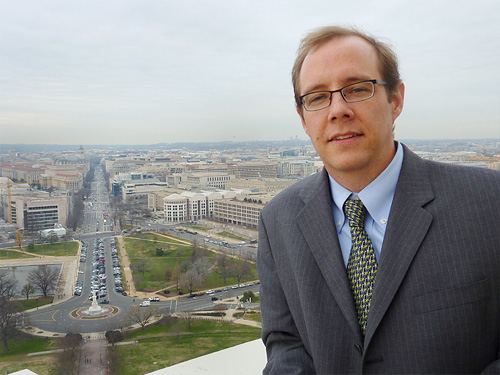
|
HTS Alumnus, Now a Congressional Chief of Staff
Eric Lausten didn't plan on ending up in politics. He went to Georgia Tech in the late 1990s to fulfill dreams of becoming an electrical engineer. But after spending four quarters developing TV cable filters, he had to face the fact that engineering just wasn't his passion.
So Lausten did what any young person does in that situation: He took the summer off and went on a cross-country road trip. When he got back to Atlanta, he was a History, Technology, and Society (HTS) major. Now, more than ten years later, he is chief of staff for U.S. Congressman Dan Lipinksi, (D-IL 3rd District.) And when his TV is in need of repair, he calls a cable guy.
Looking back, Lausten sees value in a number of other Ivan Allen College degrees he would have considered if he had known he'd end up where he is now: International Affairs, Public Policy, Economics, or perhaps one of the newly developed interdisciplinary programs, of which he is a big proponent. He feels taking a few classes outside of any major is one of the best things an undergraduate can do, especially a student in a science track.
"Engineers need to understand what their work is going to be affecting," Lausten says.
It was a lesson he learned well his senior year. In the spring of 1998, Lausten was working on his thesis to complete his HTS major. He was studying the impact of public opinion on the development of urban infrastructure, particularly MARTA. His advisor (Steven Vallas, now at Northeastern University) urged him to hit the streets and survey citizens directly on their thoughts. Lausten did, but not to the extent he now feels he should have.
"It was easy and comfortable for me to just go to the library and look up microfiche," Lausten recalls. "It was not the challenge of going out to the Gwinnett mall and meeting people."
His HTS research was his first lesson in the importance of public input on crafting policy, marketing products, and developing ideas that resonate with the communities they serve. Having true impact before and after graduation requires getting out from behind the computer screen.
"At some point, to be successful you have to engage people you don't know," he says.
This is true in any field, Lausten feels, but most certainly in policy. Science is respected on the hill - the federal science committees affect "virtually every corner of government," but Lausten worries that involvement could be better.
"There are not enough engineering and analytical people engaged in politics and government," Lausten says. "I encourage more students from the Tech community to get involved in politics and policy." He thinks students have "a lot to contribute."
Lausten cites his unique blend of liberal arts studies on a technical campus - along with a number of stints in campaigns and political offices - as helping him land the job of chief of staff with Rep. Lipinski in April, 2011.
"He is an engineer and a member of the Transportation and Infrastructure Committee and Science, Space, and Technology Committee, which makes for a good fit with my background and interests," Lausten says.
The idea of an HTS grad now working as chief of staff in Washington, D.C., is the perfect example of the flexibility Lausten advocates as a hallmark for career success. He attributes the ability to be open-minded to allowing us to see opportunities we may otherwise miss.
He should know.
"I went to Georgia Tech with the intention of becoming an engineer, but here I am 14 years later working in Congress. Not the outcome I expected when I came to Atlanta, but one I wouldn’t give up."
|
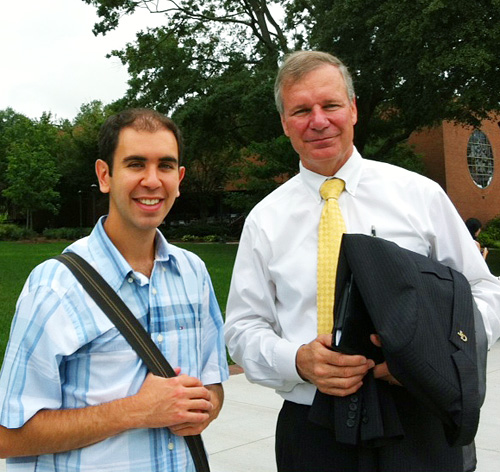
|
International Affairs Alumnus Shares Tips for Scholarship Success
(Dr. Wilf meets with President Bud Peterson in September, 2012. Photo courtesy Karen Adams, Associate Director of the Fellowships Office.)
Dr. Nabil Wilf has received a medley of international scholarships during and since his undergraduate studies at Georgia Tech: Fulbrights, a Boren Fellowship, and the Gates Cambridge Scholarship, among others. How did the 2006 graduate of Biology and The Sam Nunn School of International Affairs score so much funding for world travel and research?
Wilf visited campus in September to talk with students. He has received a number of internationally prestigious grants and scholarships to futher his studies, among which include:
- Fullbright Critical Language Enhancement Award, Syria, to study Arabic
- Fulbright Scholarship, Kuwait, to study views of women's rights among youth
- Gate Cambridge Scholarship, University of Cambridge, U.K., to study biochemistry
- National Security Education Program (Boren) Scholarship, American University of Cairo, Egypt
He has a few suggestions for those applying for similiar opportunities.
"I think it is important to have a clear vision of your goals and how you plan to achieve them. In the interview stage, it is important to convey confidence in your abilities while maintaining a modest disposition," Wilf recommended. "The best piece of advice I heard was that you are competing with no one but yourself. Although there is a finite number of awards and scholarships, the real aim is to push yourself to realize your innate potential. Continually make an effort and be proactive and see where it takes you."
As an undergraduate at Georgia Tech, Wilf participated in the International Plan, requiring students to take internationally themed coursework, obtain six months of international experience (research, work, or study abroad), and learn a second language to a level of proficiency.
"My most valuable experience at university was studying abroad in Egypt and travelling in the region, which helped me gain an appreciation for the unique opportunities that exist in the US, as well as provided a chance to learn about other societies and peoples," Wilf said.
A Gates Cambridge scholar, Wilf received his doctorate from the University of Cambridge, U.K., in 2011. He now works as a postdoctoral researcher in the Cambridge Centre for Chemical and Synthetic Biology at the Laboratory of Molecular Biology, and he looks forward to future applications of what he's learned while an undergraduate at Georgia Tech.
Wilf thinks his international affairs studies in particular "have certainly broadened my horizons and increased my understanding of the political, social, and economic developments in the world."
"With every passing year since graduating from Georgia Tech I'm more and more grateful for the excellent education I received with the support of the HOPE scholarship as a Georgia resident," Wilf said.
|
INTA Alumnus Moore is One of San Diego's '40 Under 40'
|
|
William Moore, an alumnus of The Sam Nunn School of International Affairs, was selected for San Diego Metropolitan Magazine's annual '40 Under 40' list of influential men and women in San Diego County. Moore graduated with a BS in 1996. He spent time in the Peace Corps before attending Columbia Law School. He now owns The Moore Firm, a business law firm in San Diego. Source: SD Metro Magazine, September 9, 2012. |
Public Policy Students Tackle Pension Problems in 2012 Case Competition
|
|
|
|
Six teams of graduate students from universities across Georgia competed to provide policy recommendations for a real world case: the underfunded state pension system of Illinois. The second annual School of Public Policy Case Competition was hosted August 31 by the Public Policy Graduate Student Association (PPGSA) at Georgia Tech. "The importance of using the Illinois case was for the teams to not only think about the policy implications, but also make informed recommendations given the current political, economic, and financial factors we are faced with right now," said Jenna Howard, lead organizer of the event and a graduate student in the Ivan Allen College of Liberal Arts School of Public Policy. "Our goal for the competition is for it to simulate a real-world problem, and we felt like this case was perfect for teams to have to balance these factors in their recommendations." Each team - comprised of three to five graduate students from Kennesaw State University, Georgia State University, Georgia Tech, and the University of Georgia - were given 24 hours to develop and present a policy proposal during the two-day competition. A panel of six judges ranked team's presentations on factors that included quality of statistical analysis, presentation logic, and professionalism. "All six teams did a stellar job trying to balance the interests of various parties while keeping in mind the current political and economic environment," said Howard. The University of Georgia's MPA team took first place for recommending a hybrid model for pension contributions and increased education for state employees in making wise investments for their future. Second place went to Georgia State University's Economics team, which recommended raising the retirement age and suggested a tiered model approach for employee contributions. Georgia Tech's team, the only team comprised solely of first-year graduate students, argued for an optional employee pension plan and a five-year review by an impartial party. PPGSA and other School of Public Policy students and faculty were responsible for coordinating the event, raising funds for prizes, and seeking permission to use the case, titled "Tough Choices for the Illinois Pension System" and distributed by the Harvard Business School.
|
International Affairs' Yujia He Receives Horowitz Foundation Grant
|
|
Yujia He, a doctoral student in The Sam Nunn School of International Affairs, is a recipient of a research grant from the Horowitz Foundation for Social Policy. Yujia is one of fifteen international recipients. She will apply the funding to fieldwork for her dissertation on China's rare earth industrial and trade policy. The Horowitz Foundation for Social Policy was established in 1997 to support the advancement of research and understanding in the major fields of the social sciences, including economics, political science, and urban studies. |
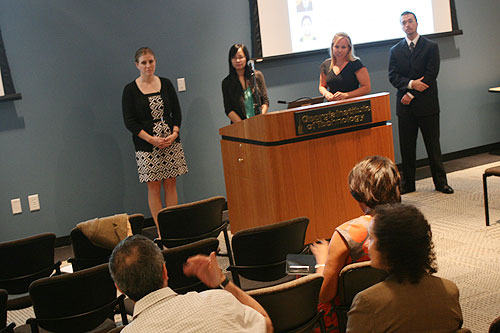
|
STIP Innovation Interns Reveal Insights on Smart Grids and the Georgia Film Industry
Two School of Public Policy graduate students selected as 2012 Georgia Innovation Program for Science, Technology and Innovation Policy (STIP) Interns presented their summer research findings on green energy and tax incentives for Hollywood to community policy developers at the Centergy Building on September 11, 2012.
 Lyndsey Knott, a masters student, studied the state business tax credits that have encouraged the entertainment industry to see Georgia as a lucrative location for filming. Knott researched the film tax credit, in part, due to the recent surge. Lyndsey Knott, a masters student, studied the state business tax credits that have encouraged the entertainment industry to see Georgia as a lucrative location for filming. Knott researched the film tax credit, in part, due to the recent surge.
"I was most surprised to learn how few states measure the economic impact of tax incentives," Knott said, regarding her research. "Many states are increasing film tax incentives, but research from institutes, such as The National Tax Foundation, argue that film tax incentives are a waste of taxpayer dollars. Millions of dollars in off-set liability due to film tax incentives are claimed yearly in the state of Georgia."
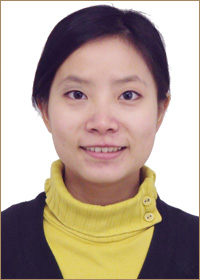 Shan Zhou, a doctoral student, researched employment and cost impacts of smart grid infrastructures to identify policies that promote energy savings, as well as economic growth. Shan Zhou, a doctoral student, researched employment and cost impacts of smart grid infrastructures to identify policies that promote energy savings, as well as economic growth.
"While the benefits that smart grid brings to our environment and power system are extensively studied, there is very scarce literature on the social and economic benefits of it," Zhou said. "I hope my research could provide a more comprehensive picture of the virtues of smart grid to policy makers."
Zhou said that Georgia is one of the key state players in smart grid manufacturing, receiving $100 million in federal funds to modernize grids.
"Georgia can better capture the economic and employment benefits of smart grid by adopting more aggressive net metering policy," she said.
STIP operates as a part of the Enterprise Innovation Institute and the School of Public Policy. The STIP internship is a competitive, paid internship program which affords recipients a chance to conduct economic development research with mentors and industry leaders within the state of Georiga.
"The program provides a valuable opportunity for the researcher to interact with local economic developers," said Knott.
Jan Youtie, a representative of the program and a principal research associate at the Enterprise Institute, says the internship is defined both by student leadership and ties to the local community.
"While the traditional internship views the intern as a subordinate, the interns in this program manage their own ideas, with substantial help from seasoned mentors, and turn these ideas into research that can form the basis for professional papers or dissertations as well as for economic development ideas in the state of Georgia," Youtie said.
The 2012 internship applications were evaluated by area industry leaders:
- Mr. Dennis Chastain, Vice President, Community and Economic Development, Georgia EMC
- Mr. Mark Lytle, Division Director, Georgia Centers of Innovation, Georgia Department of Economic Development
- Ms. Pat Sims, Manager, Community Development – Metro, Georgia Power Company
Four Georgia Tech students were awarded internships. Thirty students have received internships through the program since its inception in the summer of 2005.
|
|

